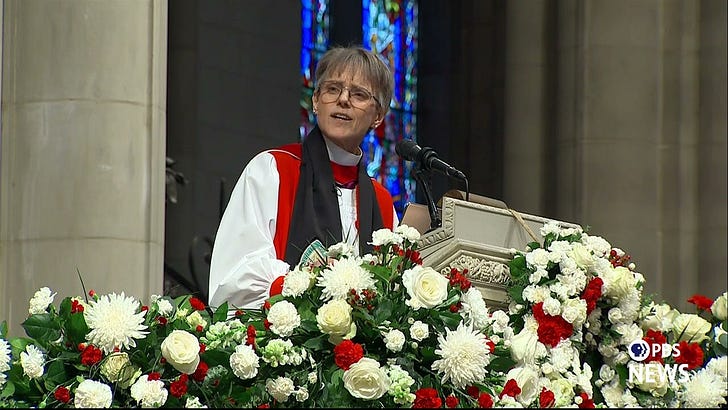Yeah, women priests. They don’t take no shit from Donald Trump.
You’ve no doubt seen the clip above. It is Episcopal Bishop Mariann Edgar Budde telling the President of the United States what he is, and — on behalf of the frightened, vulnerable, disenfranchised people of the United States — begging for mercy for them, in the name of God.
You may or may not have seen his nauseating response, which is here:
What you likely have never seen is one other time this sort of confrontation happened, many years ago. I disclosed it in a story I wrote just before the election in 2020. It’s long. You don’t have to read it. You just have to read this excerpt from the story:
Janet Vincent is an Episcopal priest from suburban New York City — and previously the rector at St. Columba’s Episcopal Church in Washington. I emailed her to ask for an interview and told her the topic. [The topic was, broadly, Donald Trump]. She agreed but asked for a day to think about it. She appears to have spent a full day thinking about it.
“My emotions are much more engaged in this than anything before. I woke up today thinking about my father. He was born in 1912 and served in the Pacific theater in World War II. He had a great hatred for the Japanese people. The thought of going to a Japanese restaurant was abhorrent to him.”
I didn’t know where this was going, but I was taking notes furiously.
“When I was about 9 years old, a Japanese family moved into the neighborhood two houses down from us, in Yonkers. I could see my father bristling, but over months, just in the activity of going out, getting into his car, this and that, he would pass the man. They began to talk, just a little. My father was a plumber. One day this man asked for some advice from my father, about plumbing in his house. My mouth dropped when I saw my father go into the man’s house, to help him.
“It was the beginning of a transformation. ... He stopped considering all Japanese people monolithically. He stopped saying ‘Japs.’ And the day he came home with a Toyota Corolla the transformation was over.”
The point, Vincent said, is that the human heart can humanize, evolving with increased familiarity. Then I asked her about her own heart. “Could you forgive Trump himself?”
“That’s a hard one,” she said. It turned out she has met Trump. Had dinner with him once, in the early 2000s.
She was the rector of a congregation in White Plains, N.Y. He was licensing his name to a tower there, and Vincent’s church ran a nearby shelter for women in crisis: victims of domestic abuse, substance abuse, women recently out of prison, homeless women desperately needing a place to stay. Trump wanted the shelter moved so that it was nowhere near his building. Vincent refused. There was a dinner meeting, arranged by a sympathetic real estate developer, to show her that Trump wasn’t such a bad guy. And there was a phone call afterward. At one point, she recalls, Trump was apparently unaware he was on speakerphone and told someone else on the call that he didn’t want “those pussies anywhere near my building.” He discovered he’d been overheard when Vincent chimed in indignantly.
When I contacted the White House for comment, I wasn’t sure what to expect. The source was obviously reputable. She was on the record, and reporting a first-hand experience. Trump’s objection to the women’s shelter became public at the time; it had gotten into the newspapers. I thought I’d probably get a terse “no comment.”
I should have known better. Politically, this is wartime. White House press secretary Kayleigh McEnany referred my question to Tim Murtaugh, communications director for the Trump campaign. His emailed response, in its entirety: “This is a totally made up, fake story that never happened.”
My final question to the Rev. Vincent: Given everything, is forgiveness really possible?
“My faith orients me toward faith in the future. The future is God, drawing us to a more hopeful world where reconciliation and justice prevail. But it’s just a Pollyanna pie in the sky unless you do the hard work of transformation, our ability to see the other as fully human. I’m not denying difference, or promoting melting-pot theory. Assimilation is not what we want to see. We want to see a celebration of our individual uniqueness.”
“I want to forgive him. To some extent I can see a hurt, desperate human being behind all that bluster. So, yes.”
I asked her about the comment from Michael Caputo, a Trump aide, saying that if Trump loses the election, “the shooting will begin. ... If you carry guns, buy ammunition, ladies and gentlemen, because it’s going to be hard to get.”
“We will need heroes and heroines,” Vincent said. “People who rise up and say, ‘No, we can’t do this.’ ... That’s what would give us a hope of salvation.”
—
That’s it for today. I have only one Gene Pool Gene Poll. I mean it partly as a joke, but also seriously from a theological viewpoint — the ability to think the best about others:
See you tomorrow, in the Invitational.




As one of those women priests I have never been prouder of my denomination than I was yesterday. Many of us have been preaching that same sermon for a long time, but until yesterday no one had the chance to preach to that particular congregation. Brava to Bishop Buddy. And I hope she has good security.
Among his litany of whiny criticisms, the Crybaby-in-Chief complained that the service was “boring.” What was he expecting, strippers?